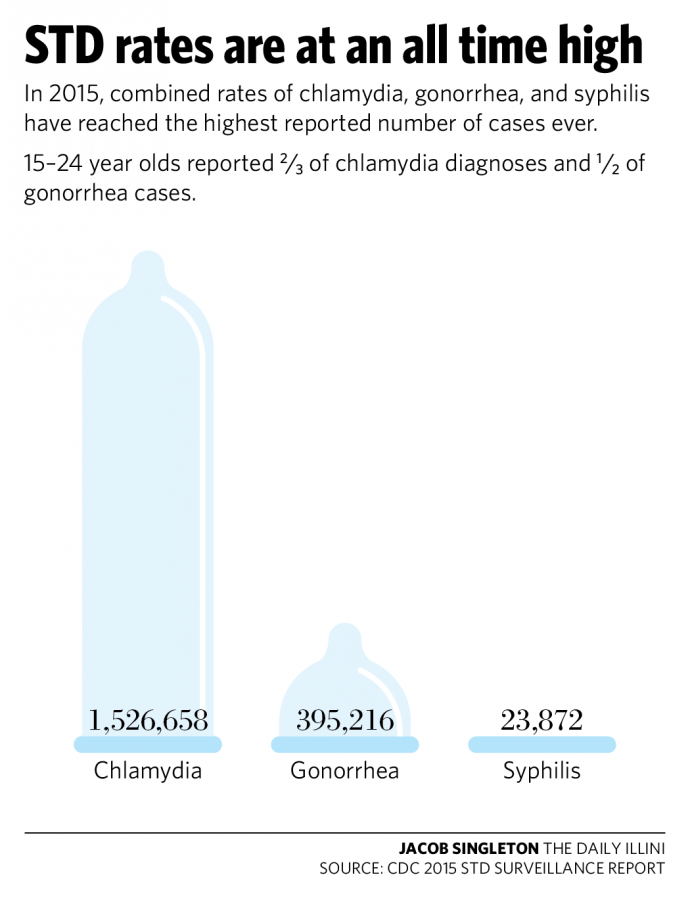STD rates are rising, most likely affecting UI students
Dec 8, 2016
The rates of syphilis, gonorrhea and chlamydia are at an all-time high, and college-aged students are most likely to be affected by rising levels, according to a recent report from the Center for Disease Control.
15 to 24-year-olds reported almost two thirds of the 1,526,658 chlamydia cases and half of the 395,216 gonorrhea cases. Syphilis rates have also risen, with numbers now reaching 23,872.
“We know that young people are disproportionately affected by STDs, so the impact is greater among young people,” said Kim Rice, McKinley’s sexual health educator and sexual health peers advisor.
Rice contributes a few factors to rising rates among millennials. Young people may have less access to medical care, which leaves cases to go undiagnosed and untreated.
People tend to have more sexual partners at a young age, compared to older people in monogamous relationships. There is also an unwillingness to use condoms, a primary resource in preventing STDs.
Get The Daily Illini in your inbox!
Chloe Coletta, a senior in AHS and Sexual Health Peers member, believes there’s a stigma against the use of condoms among college students.
“I was passing someone on the Quad and I heard something like ‘oh my gosh, and he pulled out a condom and I was so upset,’” said Coletta. “Because there’s this whole thing like if the guy brings a condom then he was expecting sex, or something like that. So there’s this kind of stigma around condoms and what the [gist] of that means.”
About 70 percent of students at Illinois are sexually active, leaving many vulnerable to the rising rates of STDs, according to Coletta.
The harshness of stigmas can cause students to avoid testing for fear of judgment among peers. There is also a lack of education contributing to rising levels.
“From when we start learning about sex, that should be something that’s talked about and it’s definitely not,” Coletta stated. “We definitely need to target people when they’re younger, to say it’s completely normal.”
With only 20 states requiring schools to provide medically accurate sexual education, some Illinois students come to the University with limited knowledge about sexual health.
McKinley Health Center offers free, confidential meetings with a sexual health educator in order to combat any gaps in knowledge a student may have.
“Students can make an appointment to speak one on one with a sexual health educator in a confidential setting,” Rice said. “They can ask any questions they might have, and we provide information to help them best protect their health.”
Most STDs, including syphilis, gonorrhea and chlamydia, do not show symptoms, showing up on test results weeks after being infected.
“A lot of STDs are curable, so you have to be tested and treated for those,” Rice stated.
A person must be tested in order to know if he or she is infected and causing harm to others.
As a student, Coletta said she has had several friends around campus that have shared their personal history with STDs.
“I’ve known a lot of friends who have gotten both gonorrhea and chlamydia,” Coletta said. “It’s not to say that I’m friends with people who are super sexually active, or anything like that. They’re completely normal people and it’s really not that big of a deal.”
Coletta stressed that with a proper diagnosis and treatment, a person can resume their normal life within a couple of weeks, comparing common STDs to the mild inconvenience of a cold.
Dr. Robert Woodward, the Medical Director at McKinley Health Center, said he is unsure if STD rates will continue to rise, but that STDs will continue to affect the health of students.
If untreated, STDs can affect a person’s fertility levels in the future. There also is a certain amount of stress relating to being infected.
“The stress of having any STD can have a negative consequence on a student that may cause anxiety,” Woodward said in an email. “The anxiety may distract students from focusing on the main reason they are (on) campus which is to get an education.”
For those with a fear of being tested, Coletta recommends going to McKinley Health Center with a friend, where testing is free with the student fees.
“Just let them know it’s a very routine exam and the people at McKinley testing for these things do it every day,” Coletta added.
STD testing is also available for no cost at the Champaign-Urbana Public Health Department.
By combating rising rates with education, both Rice and Coletta believe that students will have a greater chance of protecting themselves against STDs.
“There’s a lot of stigma around it that needs to change, even on such a liberal campus like this,” Coletta said.






